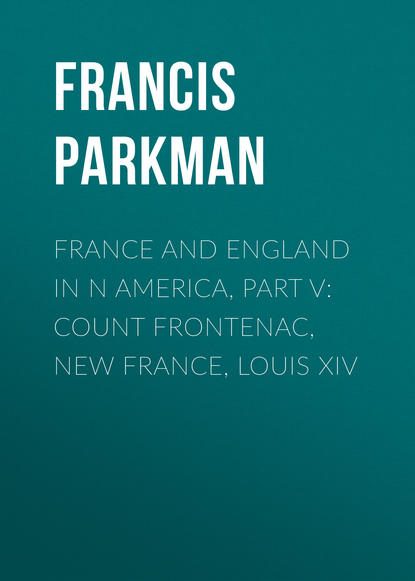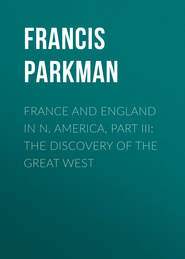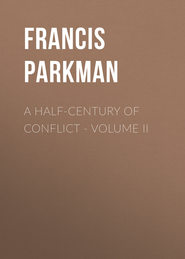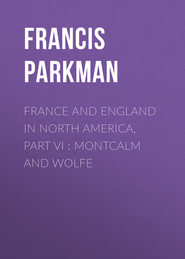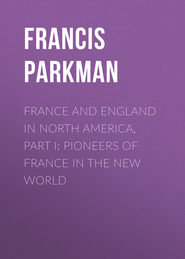По всем вопросам обращайтесь на: info@litportal.ru
(©) 2003-2024.
✖
France and England in N America, Part V: Count Frontenac, New France, Louis XIV
Настройки чтения
Размер шрифта
Высота строк
Поля
268
Mather, Life of Phips, gives an account of the outfit. Compare the Humble Address of Divers of the Gentry, Merchants and others inhabiting in Boston, to the King's Most Excellent Majesty. Two officers of the expedition, Walley and Savage, have left accounts of it, as Phips would probably have done, had his literary acquirements been equal to the task.
269
"M. le Gouverneur luy a répondu qu'il avoit reconnu avec plaisir que la Compagnie (le Conseil) conservoit la considération qu'elle avoit pour son caractère et pour sa personne, et qu'elle pouvoit bien s'assurer qu'encore qu'elle luy eust fait des propositions au delà de ce qu'elle auroit cru devoir faire pour sa reception au Conseil, il ne les auroit pas acceptées, l'honneur de la Compagnie luy estant d'autant plus considérable, qu'en estant le chef, il n'auroit rien voulu souffrir qui peust estre contraire à sa dignité." Registre du Conseil Souverain, séance du 13 Mars, 1690. The affair had occupied the preceding sessions of 20 and 27 February and 6 March. The submission of the councillors did not prevent them from complaining to the minister. Champigny au Ministre, 10 Mai, 1691; Mémoire instructif sur le Canada, 1691.
270
"Que le lac estoit tout convert de canots." Frontenac au Ministre, 9 et 12 Nov., 1690.
271
La Potherie, III. 94; Monseignat, Relation; Frontenac au Ministre, 9 et 12 Nov., 1690.
272
"Je leur mis moy-mesme la hache à la main en chantant la chanson de guerre pour m'accommoder à leurs façons de faire." Frontenac au Ministre, 9 et 12 Nov., 1690.
"Monsieur de Frontenac commença la Chanson de guerre, la Hache à la main, les principaux Chefs des François se joignant a luy avec de pareilles armes, la chanterent ensemble. Les Iroquois du Saut et de la Montagne, les Hurons et les Nipisiriniens donnerent encore le branle: l'on eut dit, Monsieur, que ces Acteurs étoient des possedez par les gestes et les contorsions qu'ils faisoient. Les Sassakouez, où les cris et les hurlemens que Mr. de Frontenac étoit obligé de faire pour se conformer à leur manière, augmentoit encore la fureur bachique." La Potherie, III. 97.
273
La Potherie, III. 96, 98.
274
On this expedition see the Journal of Major General Winthrop, in N. Y. Col. Docs., IV. 193; Publick Occurrences, 1690, in Historical Magazine, I. 228; and various documents in N. Y. Col. Docs., III. 727, 752, and in Doc. Hist. N. Y., II. 266, 288. Compare La Potherie, III. 126, and N. Y. Col. Docs., IX. 513. These last are French statements. A Sokoki Indian brought to Canada a greatly exaggerated account of the English forces, and said that disease had been spread among them by boxes of infected clothing, which they themselves had provided in order to poison the Canadians. Bishop Laval, Lettre du 20 Nov., 1690, says that there was a quarrel between the English and their Iroquois allies, who, having plundered a magazine of spoiled provisions, fell ill, and thought that they were poisoned. Colden and other English writers seem to have been strangely ignorant of this expedition. The Jesuit Michel Germain declares that the force of the English alone amounted to four thousand men (Relation de la Défaite des Anglois, 1690). About one tenth of this number seem actually to have taken the field.
275
Journal of Captain John Schuyler, in Doc. Hist. N. Y., II. 285. Compare La Potherie, III. 101, and Relation de Monseignat.
276
Frontenac au Ministre, 9 et 12 Nov., 1690.
277
Relation de Monseignat; Plan de Québec, par Villeneuve, 1690; Relation du Mercure Galant, 1691. The summit of Cape Diamond, which commanded the town, was not fortified till three years later, nor were any guns placed here during the English attack.
278
Diary of Sylvanus Davis, prisoner in Quebec, in Mass. Hist. Coll. 3, I. 101. There is a difference of ten days in the French and English dates, the New Style having been adopted by the former and not by the latter.
279
Journal of Major Walley, in Hutchinson, Hist. Mass., I. 470.
280
"Ils ne profitèrent pas du vent favorable pour nous surprendre comme ils auroient pu faire." Juchereau, 320.
281
"Les Demoiselles Lalande et Joliet." The title of madame was at this time restricted to married women of rank. The wives of the bourgeois, and even of the lesser nobles, were called demoiselles.
282
Juchereau, 323.
283
"Tous ces Officiers s'étoient habillés le plus proprement qu'ils pûrent, les galons d'or et d'argent, les rubans, les plumets, la poudre, et la frisure, rien ne manquoit," etc. Ibid.
284
See the Letter in Mather, Magnalia, I. 186. The French kept a copy of it, which, with an accurate translation, in parallel columns, was sent to Versailles, and is still preserved in the Archives de la Marine. The text answers perfectly to that given by Mather.
285
Lettre de Sir William Phips à M. de Frontenac, avec sa Réponse verbale; Relation de ce qui s'est passé à la Descente des Anglois à Québec au mois d'Octobre, 1690. Compare Monseignat, Relation. The English accounts, though more brief, confirm those of the French.
286
Journal of Major Walley; Savage, Account of the Late Action of the New Englanders (Lond. 1691).
287
Juchereau, 325, 326.
288
"Between 12 and 1,300 men." Walley, Journal. "About 1,200 men." Savage, Account of the Late Action. Savage was second in command of the militia. Mather says, 1,400. Most of the French accounts say, 1,500. Some say, 2,000; and La Hontan raises the number to 3,000.
An enemy of Frontenac writes, "Ce n'est pas sa présence qui fit prendre la fuite aux Anglois, mais le grand nombre de François auxquels ils virent bien que celuy de leurs guerriers n'étoit pas capable de faire tête." Remarques sur l'Oraison Funèbre de feu M. de Frontenac.
289
On this affair, Walley, Journal; Savage, Account of the Late Action (in a letter to his brother); Monseignat, Relation; Relation de la Descente des Anglois; Relation de 1682-1712; La Hontan, I. 213. "M. le comte de Frontenac se trouva avec 3,000 hommes." Belmont, Histoire du Canada, A.D. 1690. The prisoner Captain Sylvanus Davis, in his diary, says, as already mentioned, that on the day before Phips's arrival so many regulars and militia arrived that, with those who came with Frontenac, there were about 2,700. This was before the arrival of Callières, who, according to Davis, brought but 300. Thus the three accounts of the deserter, Belmont, and Davis, tally exactly as to the sum total.
290
La Hontan, I. 216; Juchereau, 326.
291
Père Germain, Relation de la Défaite des Anglois.





